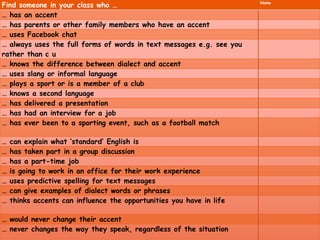
Spoken language study 2
- 1. Find someone in your class who … Name … has an accent … has parents or other family members who have an accent … uses Facebook chat … always uses the full forms of words in text messages e.g. see you rather than c u … knows the difference between dialect and accent … uses slang or informal language … plays a sport or is a member of a club … knows a second language … has delivered a presentation … has had an interview for a job … has ever been to a sporting event, such as a football match … can explain what ‘standard’ English is … has taken part in a group discussion … has a part-time job … is going to work in an office for their work experience … uses predictive spelling for text messages … can give examples of dialect words or phrases … thinks accents can influence the opportunities you have in life … would never change their accent … never changes the way they speak, regardless of the situation
- 2. Spoken Language Study L.O: To analyse and discuss different forms of communication. To understand the objectives and outcomes of this unit of study.
- 3. O Over the last decade, spoken language has become flooded with slang and abbreviations of ‘standard’ (formal) English. O https://www.youtube.com/watch?v=ymp I2mdABUM
- 4. Abbreviations/Slang O ?4U O ;S O <3 O @TEOTD O 1CE O 1WDR O 2 O 2G2BT O 2M2H O 2MI O 2MORO O 2NTE O 4 O ^5 O LOL/ROFL Standard English O I have a question for you O Hmm?!!/ unsure O Love, heart O At the end of the day O Once O I wonder O Meaning "to" in SMS O Too good to be true O Too much to handle O Too much information O Tomorrow O Tonight O Short for "for" in SMS O High-five O Laugh out load/roll on floor laughing Can you figure out the following?
- 5. When do we use slang in everyday speech? O TASK 1: Make a list of any examples of slang words you may use in conversations - try to think of at least 10 each. E.g “yeah” O TASK 2: For each slang word you think of, write the Standard English next to it. O Would you use this type of language with an adult/parent/teacher?
- 6. Over to you… O Answer the following question. You will need to write at least half a page: O Why do you think that younger generations use more slang and abbreviations in their spoken language than older generations? O Think about the internet, the Media, mobile phones, etc
- 7. Homework O We have been discussing how spoken language can alter depending on age and who you are with - how you might talk differently to an adult than with friends. O You must produce a transcript of a conversation with a friend/peer and a transcript of a conversation with a parent or adult. O Each transcript should be an A4 page each.
